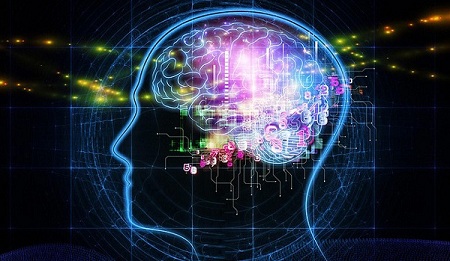How do the brains work?
15 Dec 2016
Today we look at questions such as: what is the brain of what it is, what functions are performed and how we think, remember and make decisions.

What is the brain and what it consists of?
This is our central processing unit, a system administrator of our body is the body of the CNS (Central Nervous System). From animals we differ ability to think and predict accept unfavorable decisions, but for the benefit of others.
Almost 80% of the brain is composed of water (mainly in the cytoplasm of cells), and 10-12% lipid (fat) and 8% protein. Although it accounts for only 2% of body weight, the brain uses fully organism 20-25% oxygen supply, nutrients and glucose (as fuel), all of which are supplied a constant flow of blood. The brain is protected by thick bones of the skull and the blood-brain barrier, but the character (as a complex system) of the human brain, however, makes it unstable to many kinds of diseases.
Approximately 100 billion neurons transmit signals to one another via the synaptic connections 1000 trillions. There is a constant flow and analysis of information from various outside.
The brain is responsible for controlling all bodily actions and functions. It is also a center for thinking, learning and memory. The brain gives us the ability to think, plan, speak, imagine, sleep, use the mind and emotions.
How do we think?
At the moment you are reading this text, you see each letter, see it. We will understand, why do you understand what you read, and firmly believe in the correctness of your thoughts.
- 1.Senses. They are so called because they interact with the world around you. There are 6 of the senses: eyes, ears, nose, skin, tongue and vestibular apparatus. Animals in evolution and has been developed echo location, sense the magnetic field of the Earth and other senses. With senses to understand deeply will not, so it is clear that such a skin or ears. But let's return to our example, we read, leveraging their eyes. What happens next.
- 2.Receptors. Any of the senses has its receptors are nerve cells located "in conjunction" with any sense organ. Receptors in the eyes transform the image of the eye, streamline it. Systematize information about color shades that you see where what color is of different physical objects and their location in space, many other things. All information sent in regimented intercalary neurons. In our example, with reading, at this stage, you do not understand anything.
- 3.Intercalary neurons. This intermediary neurons, they get their information from receptors and change it into electrical signals. Something like Morse code, but instead of letters and points we have a picture in front of our eyes and the best electrical signals. All this flow of "flying" to the cerebral cortex, to neurons located in it. Imagine that neuron - is communicating room. And the first "open the door to the room" dendrites. Your brain still does not understand the words.
- 4.Dendrites - a "front door" to the neuron in the brain (in fact, the information can "break through the wall and fly into the neuron," and without a door). Dendrite understands that came some information. But he really does not understand what it means. For him, you read something like «N? N h? O, w? ?? De x nx », incomprehensible words, the error 404 Dendrite sends this information to the" exit door "- the axon.
- 5.Axon in the nerve cell has many branches, it looks for a match incoming information to other neurons. And he finds them! Your brain, suddenly aware that he knew the Russian language, as full information in other neurons. And "track" from one neuron to another is constantly in use, reliable, strong. In parallel with this, in axons produced neurotransmitters that are responsible for our mood, energy and health. And neurons neurotransmitters congratulate each other for the "mutual agreement and understanding."

Here's how the brain works in cognitive activity!
Summarizing: the eyes / ears / language .. collect information, it accumulates in the respective receptors, and those sent to it structured in gusset nerve, where it is transformed into electrical signals, these signals are received and the nerve cells in the cerebral cortex dendrites. Dendrites send this information to the axon "to find matching". Axon "looking for coincidences" through neural connections with other neurons. All this happens in a split second.
If an axon is not "match", it creates a thin relationship with the new neuron (yes, they still are). The more you learn new information - the more established relationships and the stronger they are.
The opposite rule: if you do not learn something, forget the bonds become thinner. But they can be quickly restored, may be with the help of Phenotropil, Cogitum, Cortexin, Semax, Piracetam, Picamilon and so on.
Let’s Consider another 3 interesting examples: you learn to drive a car (A) on your head flying bricks (B) and you are looking around the house a ballpoint pen (C).
- A.Imagine that you first sat behind the wheel. There are so many buttons, 3 pedals (or 2), all kinds of boxes, mirrors, so still need to be of the size of the car, to understand, "I will pass here?". And because you kind of know what "squeeze the brake, remove the handbrake ...". You try to do it, but his hands do not listen to the feet, accidentally, the pedal is squeezed not completely forgotten turn on the lights, etc.
What's happening? Connections between neurons, which houses the memory of driving a car is, but no links extending to the muscles. The purpose of training is to develop and strengthen the neuromuscular connection and create new ones between neurons in the brain. The more you learn - the more connections between neurons and that they are stronger.
Noticed how quickly you turn off the alarm clock in the morning?)
- B.B. At you flying bricks! A typical situation, who does not happen) Once you realize you're not looking for connections between neurons with the memory of physics, do not you think that "judging from his path, it will fly past" or "it is small and gets into the shoulder, and I have a thick jacket and I do not feel anything.
" Once up to the dendrites reach information about "flying brick on you", all the logic just shuts down, it is taken for instincts, and you jump back, even if you have a sore leg / back / abdomen and all you lazy. Where there is a threat to life - they rule instincts. Where there is no - there is a search in the neurons of the brain and neuromuscular connections.
- C.Searching for a handle. You entered an important call, you need something quick to write. You start looking for a pen, looking eyes and ask someone nowhere. The brain is very active, tested tens of thousands of connections between neurons. Generates stress neurotransmitters that customize the brain as a stern officer in the army of soldiers rides. Stress even more suddenly alternatives are beginning to be tested as a record, and you record on your phone is on the computer, take away someone else's cell phone and writing there, trying to remember. You already do not care at all, you need just to record.
Everything has gone, you talked, the information "stored". Neurons again actively produce neurotransmitters, but positive, "I congratulate you, colleague!"
Now you know why you can lose a mobile home, but never completely forgotten how to drive a car.
And further! Perhaps you have heard that the stores often give sellers to hold product in hand - it's not just like that! So you are involved almost all the senses, you see the item, feel it, and the seller has his praises (sound) - the neurons and connections are very fast. Faster than you would just read a review on this product. That's the delicate psychology.)
How do we dream our brains work?
We can dream absolutely anywhere, anytime, this is a very important function of the brain! Dreams relax man, give him optimism that, ultimately, a positive effect on his attitude towards the world. After all, how we see the world - so it is.
Dreams added meaningfulness, consistency in our life, how would it sound strange. They show what we strive for, and as long as we strive for a dream - we are happy.
Traditionally, for the dream it corresponds to the right hemisphere of the brain. Formally, this is not the case, people are actively dreaming when "off" logic and rationality + produced neurotransmitters: endorphins, GABA, serotonin, melatonin. An optional condition is the suppression of "excitatory" neurotransmitter.
Remember your condition before you start dreaming, it is monotonous and routine action when you do not solve any problems and no stress and "disconnected". What's going on in my head at the time "off" from reality? Consider an example. Suffice it to a small but pleasant thoughts. You go down the familiar street, do not interfere, do not hurry, do not have bears and other dangers. Notice the beautiful tree, it reminds you something nice. Axon helped to find this information in some neurons and developed positive neurotransmitters.
Neurotransmitters are caught in a cage with this recollection, that, in turn, "happy" this positive moment and sent in a request to search the axon matches. He finds them very quickly and thousands of them, all produced positive neurotransmitters. At this point, you already see not only "tree" your brain to remind you how you once went with friends to the lake, barbecues, music, summer. Axons are actively looking for more matches, and has been provisionally whole brain happy) It seeks to extend this memory and "add" more colors + You already fantasize about the future is now "no match is sought" and "created" on the basis of past events.
Bottom line:
- The brain is a very complex system with about a quadrillion connections between neurons. Another thing is that one we use constantly and they are strong and reliable. Other weaknesses - what we do not remember, they gradually die. Discovering new - on the site of the old creates new neurons.
- Normally, the brain works through the senses, receptors, intercalary neurons, neurons, dendrites and axons. Memory and dreams originally "delve into neurons," without the use of the senses.
- Depending on the circumstances, we think differently.
- We told superficially, because the subject is very very deep, perhaps even pull on a book. In any case, after reading this article, we think you have any more new connections between neurons.

 Cart
Cart





